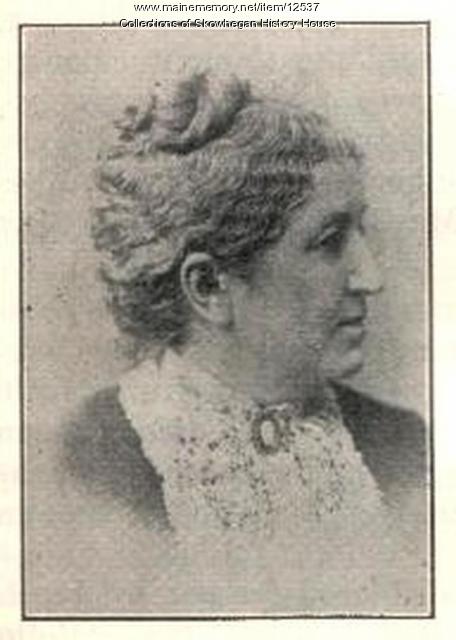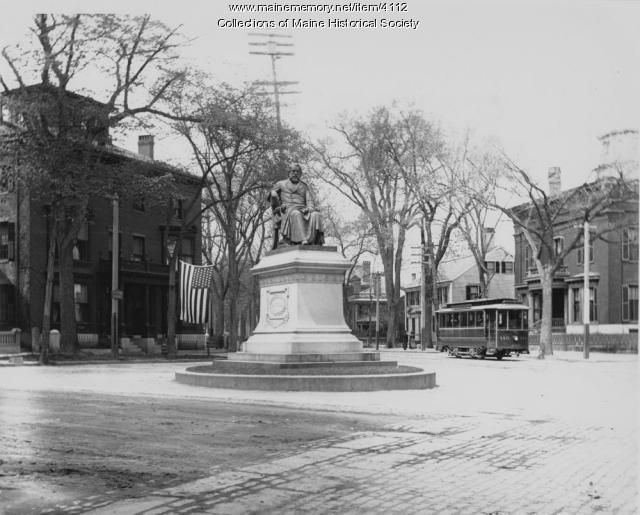Keywords: Invitations
Item 101436
Invitation to masquerade dance, Bangor, 1870
Contributed by: Maine Historical Society and Maine State Museum Date: 1870-03-22 Location: Bangor Media: Ink on paper
Item 54193
Synagogue tea invitation, Portland, 1948
Contributed by: Maine Historical Society Date: 1948-11-15 Location: Portland Media: Ink on paper
Exhibit
Desserts have always been a special treat. For centuries, Mainers have enjoyed something sweet as a nice conclusion to a meal or celebrate a special occasion. But many things have changed over the years: how cooks learn to make desserts, what foods and tools were available, what was important to people.
Exhibit
Student Exhibit: Rebecca Sophie Clarke
Sophie May, whose real name was Rebecca Clarke, was the author of over 40 books between 1861 and 1903. She wrote the "Little Prudy Series" based on the little town of Norridgewock.
Site Page
Farmington: Franklin County's Shiretown - Invitation, Farmington, 1903
"Invitation, Farmington, 1903 Contributed by Farmington Public Library Description Printed and mailed invitation to the ceremonies…"
Site Page
Skowhegan Community History - Exhibits
"We invite you to take a look and you will see all the hard work and long hours that went into creating these projects."
Story
Share your COVID-19 story for future generations
by Steve Bromage and Jamie Rice, Maine Historical Society
Learn how you can share your stories on Maine Memory Network
Story
Alice Bertrand shares highlights from her 100+ years
by Biddeford Cultural & Heritage Center
What is it like to live through all the events that have occurred in the past 100+ years?
Lesson Plan
Longfellow Studies: An American Studies Approach to Henry Wadsworth Longfellow
Grade Level: 6-8, 9-12
Content Area: English Language Arts, Social Studies
Henry Wadsworth Longfellow was truly a man of his time and of his nation; this native of Portland, Maine and graduate of Bowdoin College in Brunswick, Maine became an American icon. Lines from his poems intersperse our daily speech and the characters of his long narrative poems have become part of American myth. Longfellow's fame was international; scholars, politicians, heads-of-state and everyday people read and memorized his poems. Our goal is to show that just as Longfellow reacted to and participated in his times, so his poetry participated in shaping and defining American culture and literature.
The following unit plan introduces and demonstrates an American Studies approach to the life and work of Longfellow. Because the collaborative work that forms the basis for this unit was partially responsible for leading the two of us to complete the American & New England Studies Masters program at University of Southern Maine, we returned there for a working definition of "American Studies approach" as it applies to the grade level classroom. Joe Conforti, who was director at the time we both went through the program, offered some useful clarifying comments and explanation. He reminded us that such a focus provides a holistic approach to the life and work of an author. It sets a work of literature in a broad cultural and historical context as well as in the context of the poet's life. The aim of an American Studies approach is to "broaden the context of a work to illuminate the American past" (Conforti) for your students.
We have found this approach to have multiple benefits at the classroom and research level. It brings the poems and the poet alive for students and connects with other curricular work, especially social studies. When linked with a Maine history unit, it helps to place Portland and Maine in an historical and cultural context. It also provides an inviting atmosphere for the in-depth study of the mechanics of Longfellow's poetry.
What follows is a set of lesson plans that form a unit of study. The biographical "anchor" that we have used for this unit is an out-of-print biography An American Bard: The story of Henry Wadsworth Longfellow, by Ruth Langland Holberg, Thomas Y. Crowell & Company, c1963. Permission has been requested to make this work available as a downloadable file off this web page, but in the meantime, used copies are readily and cheaply available from various vendors. The poem we have chosen to demonstrate our approach is "Paul Revere's Ride." The worksheets were developed by Judy Donahue, the explanatory essays researched and written by the two of us, and our sources are cited below. We have also included a list of helpful links. When possible we have included helpful material in text format, or have supplied site links. Our complete unit includes other Longfellow poems with the same approach, but in the interest of time and space, they are not included. Please feel free to contact us with questions and comments.













